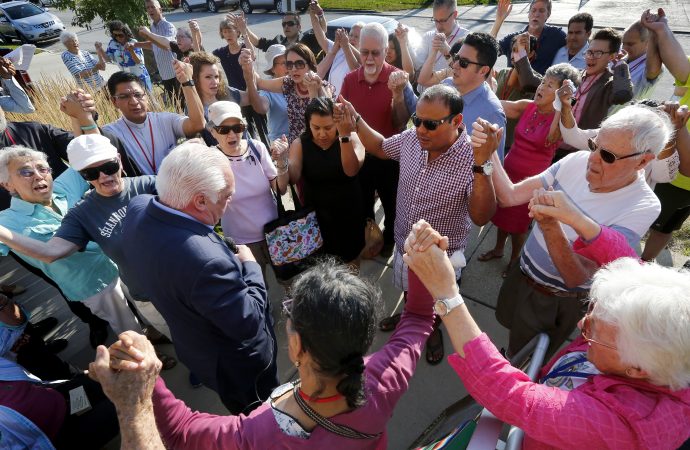New study: successful parishes are missionary

NEW YORK - Parishes with vitality are open to their communities, feel comfortable with secular leadership and prioritize a welcoming and missionary spirit during their programs according to a new study.
"Open the doors to Christ: a study on Catholic social innovation for parish vitality", published last week and published by Foundations and donors interested in Catholic activities (FADICA) lists the shared characteristics found in Catholic parishes with vital communities, which they are described as those with strong leadership and "a balance of Word, Worship and Service in the life of the parish".
The report uses a Catholic Social Innovation (CSI) paradigm to examine parochial planning and life, which researchers define as "a response to the gospel that brings together different stakeholders and perspectives to address difficult issues. These interested parties enter a safe space and, open to the Spirit, use animation and transformation processes that can unlock and unleash the group's creative and innovative ability to dialogue and develop new feasible responses. "
Researchers Marti Jewell and Mark Mogilka have identified eight common characteristics of these communities: innovation; excellent shepherds; dynamic leadership teams; a holistic and compelling vision; a priority on Sunday experience; a promotion of spiritual growth and maturity; commitment to service; and use of online communication tools.
While research for the study was conducted in 2019, the publication of the report proves particularly timely as most parishes across the nation have been forced to innovate and use online platforms in the face of the COVID-19 pandemic, which forced the temporary suspension of religious meetings in person.
"When the parishes begin to reopen, we are happy to release the results of this timely study," said Alexia Kelley, president and CEO of FADICA. "Perhaps a result of this pandemic period could be that pastors and parish leaders equipped with the results of the study could find life strategies relevant to their context."
The study examines four main areas of parish life - welcoming parishes, young adults, women and religious women in Hispanic leadership and ministry - and is the product of a survey of over 200 initiatives, websites and books, along with interviews with over 65 pastoral leaders in the United States.
Among the common attributes of welcoming parishes are those who have an attractive website, greetings trained to welcome people to mass, attention to hospitality and systems in place to follow up on new arrivals.
In successfully examining parochial life planning for young adults, researchers discovered the need for young adults to be represented in all ministries and leadership groups within the parish, regular listening sessions to get to know and respond to their needs and creative programs for the preparation of marriage and first communion which is hospitable for young families.
When it comes to female leadership, the report notes that "without exception, the respondents noted that women occupy the majority of the more than 40.000 full-time and part-time paid positions and are the backbone of parish life."
Although researchers have noted that progress has been made, they note that there are many occasions when women are discouraged by leadership. They recommend that parishes ensure a balance of women and men in parish councils and commissions and note that women and women religious should be appointed to more diocesan positions such as chancellors, department heads and councilors of the bishop.
In addition, they recommend that canon 517.2 under Church law be employed, which allows a bishop, in the absence of clergy, to appoint "deacons and other people who are not priests" to provide pastoral care for parishes.
While Hispanic Catholics are approaching a majority of US Catholics - and they are already the majority among millennial Catholics - the report notes that "the need for the ecclesial community to significantly increase the number of programs and initiatives that welcome these communities is fundamental ".
Successful parishes have bilingual websites and literature on the formation of the faith, they see parish diversity as a benefit and a grace, active and “unshakable listening and integration efforts on the imperative of providing cultural sensitivity and skills training for both leaders Anglo and Hispanic ”.
Going forward, the researchers conclude that simply doing more than what has worked in the past will not work, nor will relying solely on the clergy for the life of the parish.
“We found lay and lay women who work together with the clergy, increasing responsibility and giving life to the parish. We have seen them more welcoming than distant. We found leaders open to personal, flexible and adaptive relationships with young adults, rather than complaining or blaming culture. And rather than seeing diversity as an obstacle, leaders welcome it as a grace, embracing our brothers and sisters of all cultures and ethnic backgrounds, "they write.
By embracing co-responsibility and diversity, they conclude, parishes and pastoral leaders will find new ways to "open the doors of Christ", both "literally and figuratively".